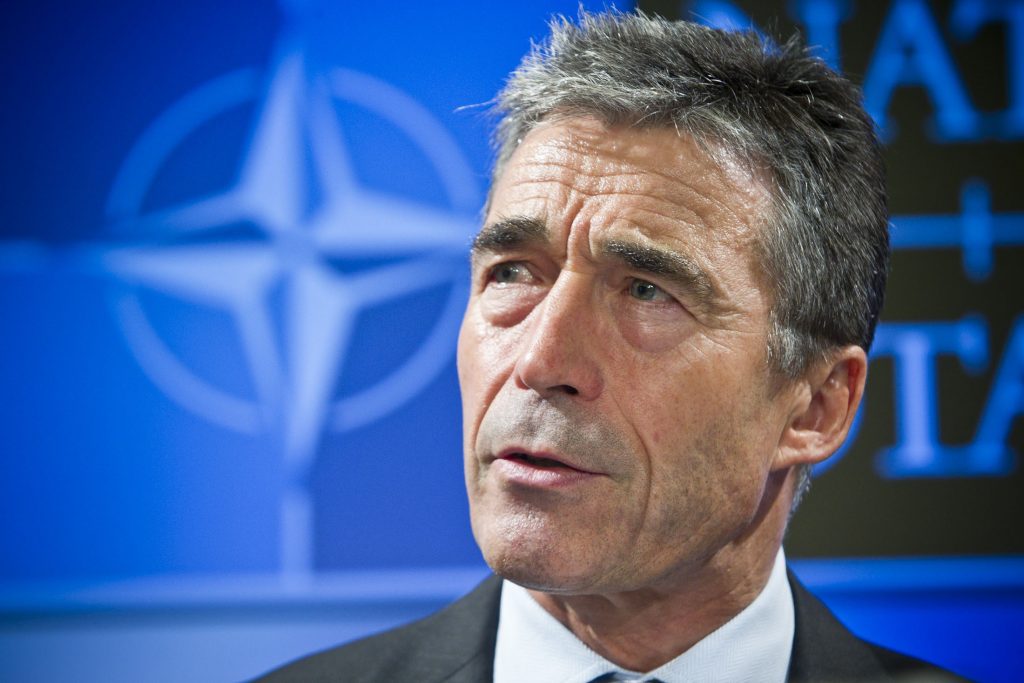
From Anders Fogh Rasmussen, NATO: How can the Trans-Atlantic community keep its global power of attraction and influence? And as the world shifts, how do we embrace that shift and help shape it?
My message today is that NATO will be a key part of the answer. In this time of uncertainty, a strong NATO is a source of confidence. It is an essential contributor to wider international security and stability. It means we can face today’s challenges from a position of strength.
For over sixty years, NATO has guaranteed the security and stability that have allowed this continent to flourish. We are an Alliance of 28 democracies. A unique forum for transatlantic dialogue – and transatlantic action. We can launch and sustain complex joint operations in a way that no one else can. We can work effectively with partners in a way that no one else can. And at our recent summit in Chicago, we took important steps to make sure this Alliance can deal with security challenges despite the economic challenges, and remain fit for the future.
At a time of global risks and threats, delivering security must be a cooperative effort. And this means NATO must continue to strengthen its connection with other countries and organisations around the globe.
Our partners have been key to NATO’s success over the past two decades. Much has been already achieved and we have reason to be proud. Militaries around the world aspire to our standards and the ability of our forces to work together. Importantly, we can integrate other nations’ contributions into complex multinational operations like no other organisation.
From Afghanistan to the Balkans, and last year over Libya, our partners have played a vital role in the operational outcome and the political legitimacy of our missions. They have made NATO stronger and kept the world safer. So it is as important for NATO to invest in strong partnerships as it is to invest in modern military hardware, and in flexible forces.
Partnership is not a choice between staying at home or going global. It is not peripheral to our business – it is part of NATO’s core business. In almost all areas, we need effective partnerships to be successful. To manage crises. To defend against emerging security challenges. And to promote stability. . . .
Let there be no doubt. This is not about replacing our existing partnerships. It is not about expanding our foot-print into other parts of the world. Nor is it about NATO assuming global responsibilities.
This is about NATO assuming a global perspective. Playing its part globally, and strengthening our ability to act in concert with our partners around the globe.
Today, we hold regular consultations with all our partners on security issues of common interest. I would like to see those consultations become much more frequent, focused and substance-driven. I believe there is considerable scope for developing clusters of willing and able Allies and partners ready to cooperate in specific areas.
I see these clusters being flexible enough to accommodate different groups of partners, yet focused enough to deliver concrete results. And I am thinking of areas such as training and education, emerging security challenges, and Smart Defence.
Today, many partner countries take the opportunities NATO offers to participate in our military education, training and exercises. But this is largely on an ad-hoc basis. I would like to see a much more structured approach. And the broadest possible range of nations being involved in such activities.
One example is cooperation among special forces. This offers considerable potential to learn more, and do more, both for NATO, and for partners. We must build on the lessons that we learnt together in action in Afghanistan. So we can boost our ability to act together in the future.
Dealing with emerging security challenges is another area where we could do more together. Issues such as maritime security, energy security, and cyber security are complex. And to confront them successfully demands a high degree of consultation, coordination, and cooperation. Taking maritime security as an example, I believe there would be huge benefit from Allied and partner navies working more closely together in specific aspects, such as counter-piracy. . . .
NATO’s partnerships play a key part in meeting the security concerns of today and tomorrow – be they local, regional, or global. The range of our partnerships reflects the world we live in. And the challenges we face.
But there is one partnership that stands out above all others. For its importance. Its uniqueness. And its value to all Allies. That is the transatlantic partnership.
The transatlantic bond lies at the very heart of NATO. It represents our common belief in freedom, democracy and the rule of law. And it provides shared leadership between North America and Europe.
Excerpts from "NATO – delivering security in the 21st century," speech by NATO Secretary General Anders Fogh Rasmussen, Chatham House, London. (photo: NATO)
Image: nato%207%204%2012%20Rasmussen_0.jpg
